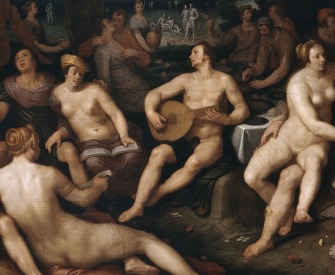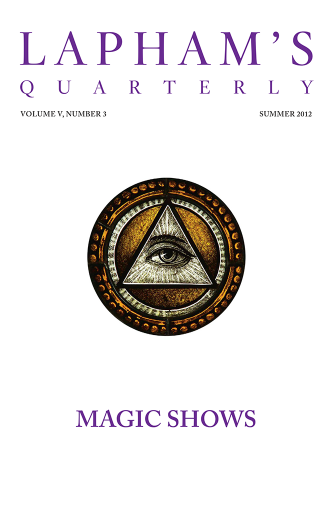At the world’s center is a place between
the land and seas and the celestial regions
where the tripartite universe is joined;
from this point everything that’s anywhere
(no matter how far off) can be observed,
and every voice goes right into its ears.
Rumor lives here; she chose this house herself,
well-situated on a mountain top,
and added on some features of her own;
it has innumerable entrances
and a thousand apertures—but not one door:
by day and night it lies completely open.
It is constructed of resounding brass
that murmurs constantly and carries back
all that it hears, which it reiterates;
there is no quiet anywhere within,
and not a part of it is free from noise;
no clamor here, just whispered murmurings,
as of the ocean heard from far away,
or like the rumbling of thunder when
great Jupiter has made the dark clouds speak.
Crowds fill the entryway, a fickle mob
that comes and goes; and rumors everywhere,
thousands of fabrications mixed with fact,
wander the premises, while false reports
flit all about. Some fill their idle ears
with others’ words, and some go bearing tales
elsewhere, while everywhere the fictions grow,
as everyone adds on to what he’s heard.
Here are credulity and heedless error,
with empty joy and fearful consternation;
and here, with unexpected treachery,
are whispers of uncertain origin;
nothing that happens, whether here on earth
or in the heavens or the seas below,
is missed by Rumor as she sweeps the world.
From Metamorphoses. Ovid completed this epic twenty-seven years after the publication of Virgil’s Aeneid. Banished to the Black Sea by Emperor Augustus in the year 8, he attributed his disgrace to “a poem and a mistake”—the former his Ars Amatoria, the latter presumably his knowledge of the debauchery of the emperor’s granddaughter. Ovid counted among his friends the poets Horace and Propertius, and the grammarian Hyginus.
Back to Issue





